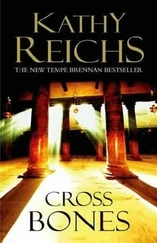Reichs, Kathy - Fatal Voyage
Здесь есть возможность читать онлайн «Reichs, Kathy - Fatal Voyage» весь текст электронной книги совершенно бесплатно (целиком полную версию без сокращений). В некоторых случаях можно слушать аудио, скачать через торрент в формате fb2 и присутствует краткое содержание. Жанр: Старинная литература, на английском языке. Описание произведения, (предисловие) а так же отзывы посетителей доступны на портале библиотеки ЛибКат.
- Название:Fatal Voyage
- Автор:
- Жанр:
- Год:неизвестен
- ISBN:нет данных
- Рейтинг книги:4 / 5. Голосов: 1
-
Избранное:Добавить в избранное
- Отзывы:
-
Ваша оценка:
- 80
- 1
- 2
- 3
- 4
- 5
Fatal Voyage: краткое содержание, описание и аннотация
Предлагаем к чтению аннотацию, описание, краткое содержание или предисловие (зависит от того, что написал сам автор книги «Fatal Voyage»). Если вы не нашли необходимую информацию о книге — напишите в комментариях, мы постараемся отыскать её.
Fatal Voyage — читать онлайн бесплатно полную книгу (весь текст) целиком
Ниже представлен текст книги, разбитый по страницам. Система сохранения места последней прочитанной страницы, позволяет с удобством читать онлайн бесплатно книгу «Fatal Voyage», без необходимости каждый раз заново искать на чём Вы остановились. Поставьте закладку, и сможете в любой момент перейти на страницу, на которой закончили чтение.
Интервал:
Закладка:
The niece?
I felt a smile tug the corners of my mouth.
At times neutrality is difficult.
I found Simon Midkiff bundled in overcoat, gloves, and muffler, dozing in a rocker on his front stoop. A brimmed cap hid most of his face, and I suddenly thought of another question.
“Simon?”
His head snapped up and the watery eyes blinked in confusion.
“Yes?”
He wiped a hand across his mouth, and a filament of saliva glistened on wool. Removing the glove, he dug under layers of clothing, withdrew glasses, and slid them onto his nose.
Recognition.
“I'm glad to see you are all right.” Chains looped to either side of his head, throwing delicate shadows across his cheeks. The skin looked pale and paper-thin.
“Can we talk?”
“Of course. Perhaps we should go inside.”
We entered a combination kitchenette–living area with one interior door, which I presumed led to a bedroom and bath. The furnishings were lacquered pine, and looked like they'd come from a home workshop.
Books lined the baseboards, and notebooks and papers covered a table and desk. A dozen boxes were stacked at one end of the room, each marked with a series of archaeological grid numbers.
“Tea?”
“That would be nice.”
I watched as he filled a kettle, took Tetley's bags from their paper holders, placed cups on saucers. He seemed frailer than I remembered, more stooped.
“I don't get many visitors.”
“This is lovely. Thank you.”
He led me to an afghan-draped sofa, placed both cups on a coffee table made from a slice of tree trunk, and dragged a chair opposite.
We both drank. Outside, I heard the whiney buzz of an outboard motor on the Oconaluftee River. I waited until he was ready.
“I'm not sure how well I can talk about it.”
“I know what happened, Simon. What I don't understand is why.”
“I wasn't there in the beginning. What I know comes from others.”
“You knew Prentice Dashwood.”
He leaned back, and his eyes shifted to another time.
“Prentice was an insatiable reader with a staggering array of knowledge. There was nothing that didn't interest him. Darwin. Lyell. Newton. Mendelyev. And the philosophers. Hobbs. Aenesidemus. Baumgarten. Wittgenstein. Lao-tzu. He read everything. Archaeology. Ethnology. Physics. Biology. History.”
He interrupted to sip his tea.
“And he was wonderful at spinning yarns. That's how it began. Prentice told stories of his ancestor's Hell Fire Club, describing the members as rakish good fellows who banded together for riotous profanity and intellectual conversation. The idea seemed benign enough. And for a while it was.”
His cup trembled in its saucer as he set it down.
“But Prentice had a darker side. He believed that certain human beings were more valuable than others.” His voice trailed off.
“The intellectually superior,” I prodded.
“Yes. As Prentice aged, his worldview was strongly influenced by his cross-cultural reading on cosmology and cannibalism. His grasp on reality diminished.”
He paused, sorting through things he could say.
“It started out as frivolous blasphemy. No one really believed it.”
“Believed what?”
“That eating the dead negated the finality of death. That partaking of the flesh of another human being allowed the assimilation of soul, personality, and wisdom.”
“Is that what Dashwood believed?”
One bony shoulder shrugged.
“Perhaps he did. Perhaps he simply used the idea, and for the inner circle the actual act, as a way to keep the club intact. Collective indulgence in the forbidden. The in-group, out-group mindset. Prentice understood that cultural rituals exist to reinforce the unity of those performing them.”
“How did it start?”
“An accident.”
He sniffed.
“A bloody accident. A young man showed up at the lodge one summer. God knows what he was doing way out there. There was a lot of drinking, a fight, the boy was killed. Prentice proposed that everyone—”
He withdrew a hanky and ran it over his eyes.
“This took place before the war. I learned about it years later when I overheard a conversation that was not for my ears.”
“Yes.”
“Prentice cut slivers of muscle from the boy's thigh and required everyone to partake. They had no inner- outer-circle distinction back then. It was a pact. Each was a participant and equally guilty. No one would talk about the boy's death. They buried the body in the woods, the following year the inner circle was formed, and Tucker Adams was killed.”
“Intelligent men accepted this insanity? Educated men with wives, and families, and responsible jobs?”
“Prentice Dashwood was an extraordinarily charismatic man. When he spoke, everything made sense.”
“Cannibalism?” I kept my voice calm.
“Do you have any idea how pervasive the theme of humans eating humans is in Western culture? Human sacrifice is mentioned in the Old Testament, the Rig-Veda. Anthropophagy is central to the plot of many Greek and Roman myths; it's the centerpiece of the Catholic Mass. Look at literature. Jonathan Swift's ‘Modest Proposal’ and Tom Prest's tale of Sweeney Todd. Movies Soylent Green; Fried Green Tomatoes; The Cook, the Thief, His Wife, Her Lover; Jean-Luc Godard's Weekend. And let's not forget the children: Hansel and Gretel, the Gingerbread Man, and various versions of Snow White, Cinderella, and Red Riding Hood. Grandma, what big teeth you have!”
He drew a tremulous breath.
“And, of course, there are the participants of necessity. The Donner party; the rugby team stranded in the Andes; the crew of the yacht Mignonette; Marten Hartwell, the bush pilot marooned in the Arctic. We are fascinated by their tales. And we embrace our famous-for-fifteen-minutes serial killer cannibals with even greater curiosity.”
Another deep breath, exhaled slowly.
“I can't explain it, don't condone it. Prentice made everything sound exotic. We were naughty boys sharing an interest in a wicked topic.”
“Fay ce que voudras.”
I recited the words carved above the entrance to the basement tunnel. During my convalescence, I'd learned that the Rabelais quote in sixteenth-century French also graced the archway and fireplaces at Medmenham Abbey.
“‘Do what you like,’” Midkiff translated, then laughed mirthlessly. “It's ironic. The Hell Fires used the quote to sanction their licentious indulgence, but Rabelais actually credits the words to Saint Augustine. “‘Love God and do what you like. For if with the spirit of wisdom a man loves God, then, always striving to fulfil the divine will, what he wishes should be the right thing.’”
“When did Prentice Dashwood die?”
“Nineteen sixty-nine.”
“Was someone killed?” We had found only eight victims.
“There could be no replacement for Prentice. Following his death no one was elevated to the inner circle. The number dropped to six and remained there.”
“Why wasn't Dashwood on the fax you sent me?”
“I wrote down what I could recollect. The list was far from complete. I know almost nothing about those who joined after I left. As for Prentice, I just couldn't—” He glanced away. “It was so long ago.”
For a long moment, neither of us spoke.
“You really didn't know what was going on?”
“I put it together after Mary Francis Rafferty died in 1972. That's when I withdrew.”
“But said nothing.”
“No. I give no excuse.”
“Why did you tip Sheriff Crowe about Ralph Stover?”
“Stover joined the club after I dropped out. That's why he moved to Swain County. I've always known he was unstable.”
I remembered my most recent question.
Читать дальшеИнтервал:
Закладка:
Похожие книги на «Fatal Voyage»
Представляем Вашему вниманию похожие книги на «Fatal Voyage» списком для выбора. Мы отобрали схожую по названию и смыслу литературу в надежде предоставить читателям больше вариантов отыскать новые, интересные, ещё непрочитанные произведения.
Обсуждение, отзывы о книге «Fatal Voyage» и просто собственные мнения читателей. Оставьте ваши комментарии, напишите, что Вы думаете о произведении, его смысле или главных героях. Укажите что конкретно понравилось, а что нет, и почему Вы так считаете.






